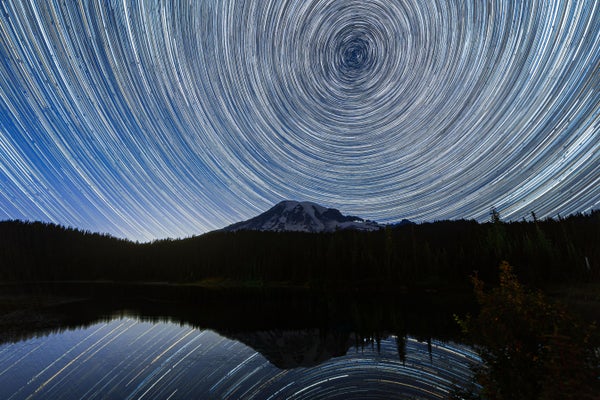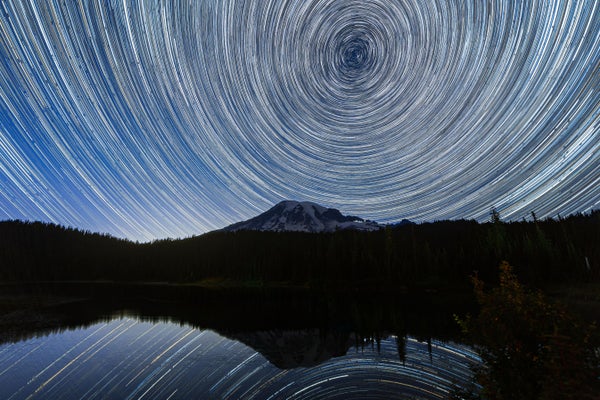
[ad_1]
Global Warming Is Slowing the Earth’s Rotation
Drastic polar ice melt is slowing Earth’s rotation, counteracting a speedup from the planet’s liquid outer core. The upshot is that we might need to subtract a leap second for the first time ever within the decade

Joseph Gruber/Alamy Stock Photo
As rising global temperatures melt Earth’s polar ice sheets, the shifting water is creating such a huge redistribution of our planet’s mass that its rotation speed is dropping. This unusual result of climate change is interacting with other forces that affect the planet’s rotational speed in ways that could ultimately even alter the way we keep time. In just a few years, we may have to make the first-ever deletion of a “leap second”—according to a new study published on Wednesday in Nature.
“This is another one of those ‘this has never happened before’ things that we’re seeing from global warming: the idea that this effect is large enough to change the rotation of the entire Earth,” says study co-author Duncan Agnew, a geophysicist at the Scripps Institution of Oceanography.
The mass of the miles-thick ice sheets that cover Greenland and Antarctica exerts a strong gravitational pull on the oceans. As the ice sheets melt, all that mass shifts away from the poles and toward the equator, reducing that pull and also causing Earth’s rotation to slow down. To understand why this happens, picture a figure skater gracefully spinning on the ice with their arms tucked tightly around their head. As they gradually lower their arms and extend those limbs outward, their spin slows down.
On supporting science journalism
If you’re enjoying this article, consider supporting our award-winning journalism by subscribing. By purchasing a subscription you are helping to ensure the future of impactful stories about the discoveries and ideas shaping our world today.
“It’s so interesting how multifaceted the impacts of ice melts are,” says Kylie Kinne, a physical oceanographer who specializes in ice sheet effects on fjord circulation and was not involved in the new study. “We keep discovering new ways that [ice melt] is changing the climate and planet, and this study really highlights that.”
The discovery comes with some startling implications for timekeeping. Most of the world uses Coordinated Universal Time (UTC) to regulate clocks and time. Because measuring techniques have grown vastly more precise in the past few decades, a leap second has occasionally been added to UTC to compensate for the slowing of Earth’s rotation, which is linked to various other factors. For example, the gravitational pull of both the sun and moon create a tidal bulge in the oceans that acts to slow the planet’s rotation.
When a leap second is added, the last minute of a designated day extends to 61 seconds, with the additional second labeled as 23:59:60. This maintains alignment between civil time, based on Earth’s rotation relative to the sun and the standard time used for daily life, and the much more precise atomic time.
What Agnew found is that the slowdown caused by polar ice melt has been effectively masking a speedup of Earth’s rotation caused by changes in the rotation of our liquid outer core. Over the past 50 years, a day has become about 0.0025 second shorter. If global warming never happened, we would likely have needed to subtract a leap second sooner. But with the influence of warming, Agnew estimates, we will need to do so by around 2028 or 2029, although he admits his prediction is uncertain. “There’s never been a negative leap second before, and leap seconds themselves have always been a problem for people running computer networks,” Agnew says, given that many crucial systems rely on precise timekeeping. “Having to include a negative leap second would be a bigger problem because they’ve never had to do it.”
But Spahr Webb, a physicist at the Lamont-Doherty Earth Observatory, who was not involved in the new study, contends that leap seconds don’t matter very much outside of telecommunications. “I’m amazed that they’re still implementing leap seconds,” he says. “The Earth’s rotation is changing all the time.” In 2022 the International Bureau of Weights and Measures (BIPM), the organization responsible for global timekeeping, voted to abolish leap seconds by 2035. How this new research could impact such a decision remains to be seen.
“Despite our perceptions as humans, the Earth is not a perfect timekeeper,” says Harvard University geophysicist Jerry X. Mitrovica, who reviewed the new study and co-wrote a commentary on it for Nature. He says these findings highlight the divide between our lived experience and the technology that surrounds us. “How do we handle that divide?” he says. “Do we continue to address this divide by adding or subtracting seconds from our definition of a day, or do we accept this irregular difference as normal and give up the bother of continuously correcting?”
[ad_2]